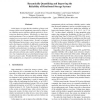Free Online Productivity Tools
i2Speak
i2Symbol
i2OCR
iTex2Img
iWeb2Print
iWeb2Shot
i2Type
iPdf2Split
iPdf2Merge
i2Bopomofo
i2Arabic
i2Style
i2Image
i2PDF
iLatex2Rtf
Sci2ools
104
click to vote
SRDS
2008
IEEE
2008
IEEE
Dynamically Quantifying and Improving the Reliability of Distributed Storage Systems
In this paper, we argue that the reliability of large-scale storage systems can be significantly improved by using better reliability metrics and more efficient policies for recovering from hardware failures. Specifically, we make three main contributions. First, we introduce NDS (Normalcy Deviation Score), a new metric for dynamically quantifying the reliability status of a storage system. Second, we propose MinI (Minimum Intersection), a novel recovery scheduling policy that improves reliability by efficiently reconstructing data after a hardware failure. MinI uses NDS to tradeoff reliability and performance in making its scheduling decisions. Third, we evaluate NDS and MinI for three common data-allocation schemes and a number of different parameters. Our evaluation focuses on a distributed storage system based on erasure codes. We find that MinI improves reliability significantly, as compared to conventional policies.
Better Reliability Metrics | Distributed And Parallel Computing | Hardware Failure | SRDS 2008 | Storage System |
Related Content
| Added | 01 Jun 2010 |
| Updated | 01 Jun 2010 |
| Type | Conference |
| Year | 2008 |
| Where | SRDS |
| Authors | Rekha Bachwani, Leszek Gryz, Ricardo Bianchini, Cezary Dubnicki |
Comments (0)

